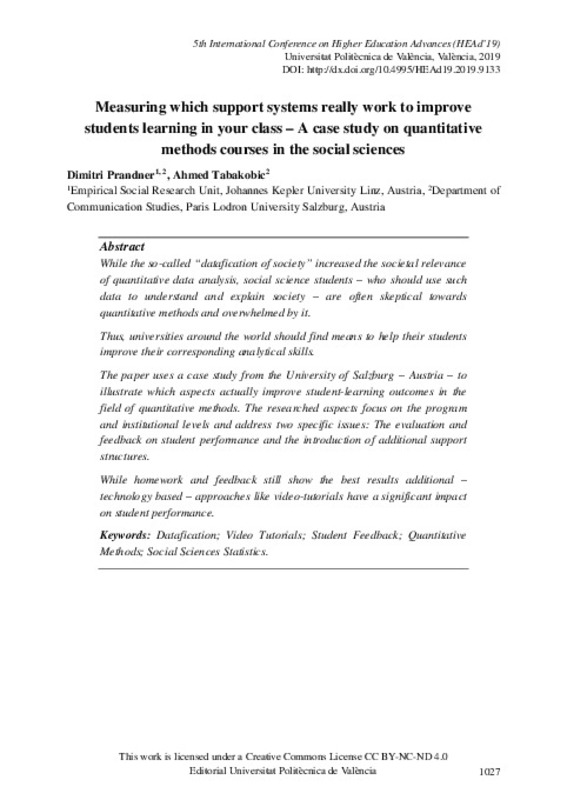JavaScript is disabled for your browser. Some features of this site may not work without it.
Buscar en RiuNet
Listar
Mi cuenta
Estadísticas
Ayuda RiuNet
Admin. UPV
Measuring which support systems really work to improve students learning in your class – A case study on quantitative methods courses in the social sciences
Mostrar el registro sencillo del ítem
Ficheros en el ítem
| dc.contributor.author | Prandner, Dimitri
|
es_ES |
| dc.contributor.author | Tabakovic, Ahmed
|
es_ES |
| dc.date.accessioned | 2019-09-05T06:36:49Z | |
| dc.date.available | 2019-09-05T06:36:49Z | |
| dc.date.issued | 2019-07-05 | |
| dc.identifier.isbn | 9788490486610 | |
| dc.identifier.issn | 2603-5871 | |
| dc.identifier.uri | http://hdl.handle.net/10251/125040 | |
| dc.description.abstract | [EN] While the so-called “datafication of society” increased the societal relevance of quantitative data analysis, social science students – who should use such data to understand and explain society – are often skeptical towards quantitative methods and overwhelmed by it. Thus, universities around the world should find means to help their students improve their corresponding analytical skills. The paper uses a case study from the University of Salzburg – Austria – to illustrate which aspects actually improve student-learning outcomes in the field of quantitative methods. The researched aspects focus on the program and institutional levels and address two specific issues: The evaluation and feedback on student performance and the introduction of additional support structures. While homework and feedback still show the best results additional – technology based – approaches like video-tutorials have a significant impact on student performance. | es_ES |
| dc.format.extent | 8 | es_ES |
| dc.language | Inglés | es_ES |
| dc.publisher | Editorial Universitat Politècnica de València | es_ES |
| dc.relation.ispartof | HEAD'19. 5th International Conference on Higher Education Advances | es_ES |
| dc.rights | Reconocimiento - No comercial - Sin obra derivada (by-nc-nd) | es_ES |
| dc.subject | Higher Education | es_ES |
| dc.subject | Learning | es_ES |
| dc.subject | Educational systems | es_ES |
| dc.subject | Teaching | es_ES |
| dc.subject | Datafication | es_ES |
| dc.subject | Video Tutorials | es_ES |
| dc.subject | Student Feedback | es_ES |
| dc.subject | Quantitative methods | es_ES |
| dc.subject | Social Sciences Statistics | es_ES |
| dc.title | Measuring which support systems really work to improve students learning in your class – A case study on quantitative methods courses in the social sciences | es_ES |
| dc.type | Capítulo de libro | es_ES |
| dc.type | Comunicación en congreso | es_ES |
| dc.identifier.doi | 10.4995/HEAD19.2019.9133 | |
| dc.rights.accessRights | Abierto | es_ES |
| dc.description.bibliographicCitation | Prandner, D.; Tabakovic, A. (2019). Measuring which support systems really work to improve students learning in your class – A case study on quantitative methods courses in the social sciences. En HEAD'19. 5th International Conference on Higher Education Advances. Editorial Universitat Politècnica de València. 1027-1034. https://doi.org/10.4995/HEAD19.2019.9133 | es_ES |
| dc.description.accrualMethod | OCS | es_ES |
| dc.relation.conferencename | Fifth International Conference on Higher Education Advances | es_ES |
| dc.relation.conferencedate | Junio 26-28, 2019 | es_ES |
| dc.relation.conferenceplace | València, Spain | es_ES |
| dc.relation.publisherversion | http://ocs.editorial.upv.es/index.php/HEAD/HEAD19/paper/view/9133 | es_ES |
| dc.description.upvformatpinicio | 1027 | es_ES |
| dc.description.upvformatpfin | 1034 | es_ES |
| dc.type.version | info:eu-repo/semantics/publishedVersion | es_ES |
| dc.relation.pasarela | OCS\9133 | es_ES |








